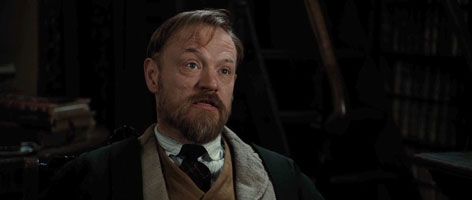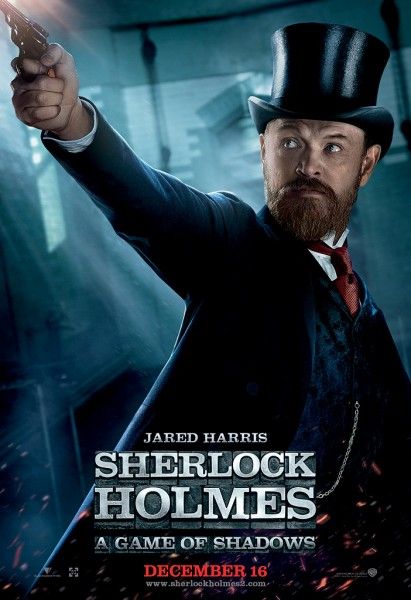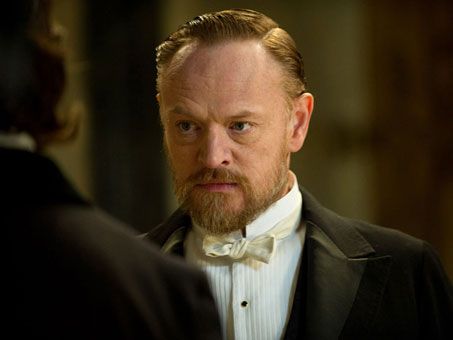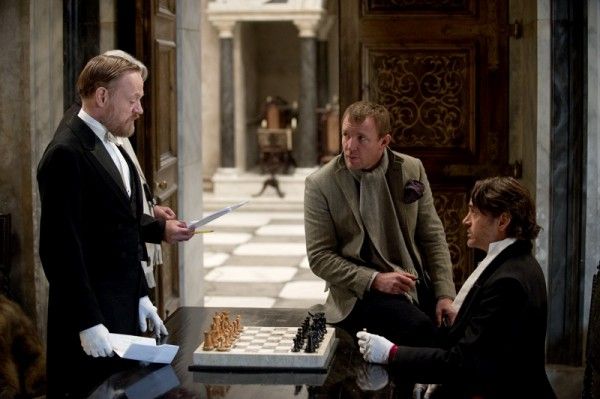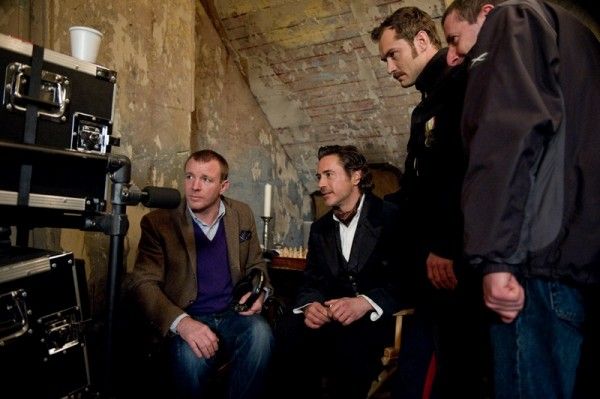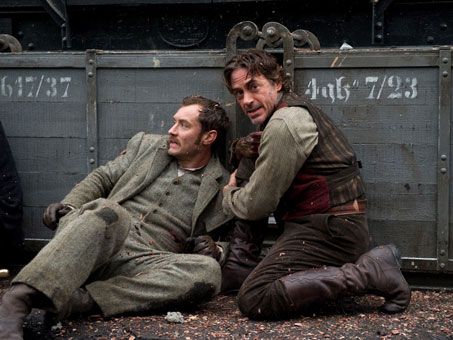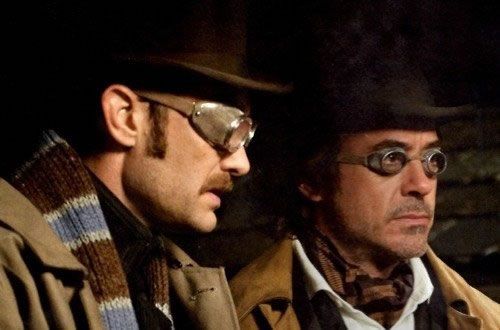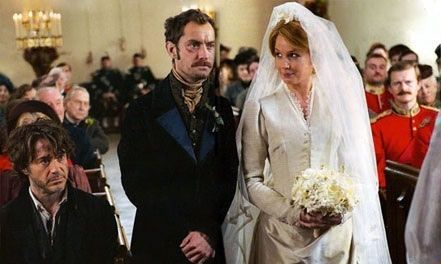In the sequel to Guy Ritchie's Sherlock Holmes, Jared Harris (Mad Men) plays the villain Moriarty, Holmes’ nemesis that was referred to at the end of the first flick. While the safe choice for Warner Bros. would have been to cast a huge star to play the villain, I think the casting of Harris was brilliant and perfect. First, he's a great actor. But just as important as his talents in front of the camera is the fact that he's a chameleon-like character actor. If the studio had cast someone like Tom Cruise in the role, you'd have a tough time seeing Moriarty on screen. However, with Harris as Holmes' arch nemesis, I think they've nailed the casting and audiences are going to be in for a really fun ride.
Earlier this year I got to visit the set of Sherlock Holmes: A Game of Shadows when the production was filming outside of London. While on set I got to participate in a group interview with Harris where he talked about how he got cast, the way he worked with Robert Downey Jr. and Ritchie, the story of the sequel, how his Moriarty is so manipulative that he doesn’t need to commit violence himself or kill people as he can get others to do it for him, his research into the role, and a lot more. Hit the jump for more.
Before going any further, if you missed the recent trailer, I'd watch that first.
Here's a few of the highlights from the interview:
- Harris landed the part of Moriarty at the very last minute. Shooting began a week or 10 days after he found out the part was his.
- He didn’t have to do a ton of research for the role because he had read all the Sherlock Holmes stories before and knew them very well.
- He did his fair share of improvising on set with the other actors, given Robert Downey Jr.’s penchant for changing things up frequently.
- Most of his scenes were with Downey Jr.
- He says Moriarty is so manipulative that he doesn’t need to commit violence himself or kill people, he can get everyone to do what he needs to do.
- He and Guy Ritchie talked about the character and decided they didn’t want him to be the typical bad guy who gives a big speech toward the end of the movie laying out his plans, giving the good guy enough time to fix things. So with Moriarty, he never lays out what he’s trying to do and remains a mystery throughout the course of the film.
- Ritchie is extremely open to new ideas and trying new dialogue on the spot.
- The whole story of Sherlock Holmes: A Game of Shadows is a plot that Moriarty has set in motion long before the story starts, so the film is Holmes arriving at the end stages of that plan and trying to stop it.
Here's the full on set interview. You can also click here to listen to the audio.
Question: When you saw the first film, did you think you’d be the one standing in the shadows?
Jared Harris: No. Of course not. It never entered my mind.
What was it like landing this part?
Harris: It was a great surprise. It was very last minute. They were entertaining a lot of other big name options, so they were going all through that part that they go through. I probably know about as much about it as you do, because I read what you do. So I didn’t know how that was panning out. Then it was back in the end of September - I happened to be in Switzerland visiting a friend, and I flew to London to meet Guy [Ritchie]. And they started shooting a week or 10 days later.
Where in Switzerland?
Harris: No it wasn’t. It was Champery – a friend of mine had a little chalet and he kept saying come on out come on out, and I said yeah if I have the time one day, and he said listen, I’m selling the fucking place so you either come now...
So did you then have a mad rush to do all your research before production began?
Harris: I’d read all the Sherlock Holmes before so I knew it really well. There isn’t really a hell of a lot in terms of Moriarty research that you can do from the books. He only actually appears in two stories. He’s talked about a lot. But in terms of information that would really inform the character, there was only really two stories, so there wasn’t a lot of catching up to do in that sense, but there was a lot of catching up in terms of it being a giant machine, and the train was definitely leaving the station and you had to catch up very quickly.
Much was made out of Downey Jr.’s muscling up for the role and getting in shape—
Harris: Well he needs to because I’m super-fit!
Do you get in on some of the action as well?
Harris: There might be.
A little special pecial training?
Harris: There might be. There might be some Fight Club action going on, but you know what the first rule of Fight Club is, don’t you?
There are many different versions of the character Moriarty, was it important for you to cast them aside or was there something you wanted to use or retain?
Harris: There have been lots of them that have been really good ones. That’s what interesting about them – it’s quite open. The main thing that has been great about Moriarty is this sense of mystery, of who this person is, because you don’t know a lot about him. So that for example allowed in The Seven Percent Solution them to create the idea that Moriarty was Sherlock Holmes’ teacher, who was having the affair with his mother, and so that’s where the obsession with Moriarty comes from, so it was a sort of psychological one. And you have lots of other different ones. So it really allowed us to be able to not feel like we were totally stuck in terms of having to fulfil whatever expectations there were, because he’s more of a mysterious character. So whatever choices you do make about it, you still have to honor that air of mystery, which means you can’t say too much even within the body of the story. It’s nice if you really still don’t know a hell of a lot about him. There were earlier versions of the script where there was all this back story going on that explained [the motivations behind his actions], and William Goldman talks about that in his book ‘Adventures in the Screen Trade’ – he talks about the more you explain a character, the weaker you make him. You have to leave an area where the audience is able to fill it in with their imagination.
Robert is known for improvising and changing dialogue onset. How has that been to work with and have you been improvising as well?
Harris: You have to. It’s part of the way—often in films there’s more of allowing the actors to make the dialogue fit better in their own. Also, you get to a location and the geography is different, so the lines don’t line up the right way, so you do have to change stuff. But there’s a lot of input from the other actors, which is great fun. To put your own versions in. Generally what happens is you chuck out all these ideas and they go ‘There’s a reason you’re an actor and not a writer. Cut!’ But you tend to over-write anyway, always. Even if they let you take a shot at what you’re going to say in a scene, you end up writing a monologue for yourself, and you end up only needing three of those lines or two of those lines.
It has to be a little different than Mad Men.
Harris: Yes, you can’t change the punctuation on that.
What are you shooting today?
Harris: Today we’re doing a scene in Paris and it’s at a hotel and I’m not sure how much I can give away. There is actually something that’s revealed in this scene that actually you only find out about a little bit later on, but it takes place in a hotel in Paris, and apparently I’ve got a train to catch.
How far into the film are you at this point?
Harris: It’s page 60.
One of the things about Robert’s take on Sherlock Holmes is that it’s funnier than most of the other versions. Does Moriarty get to be funny?
Harris: No, not really. We’ve sorted of batted around some of the stuff to do with this, but the trouble with the villain is that it’s really easy – especially in light of the Austin Powers films – to pastiche the villain. And you can really quickly tip into not just comedy, but also satire. So there’s not a lot [of humor] – we keep him very on-point. And a lot of the humour that Robert and Jude had was a kind of banter that they had between the two of them, and most of my scenes are with Robert and there isn’t a lot of good-natured banter that goes on between those two characters.
I would imagine that you’re not in every scene in the film. How has it been to shoot for you? Are you getting a lot of breaks or are you filming a lot of your stuff together?
Harris: It’s been spread out over the last couple of months
So you’re working two days in a row then have a week off?
Harris: Yeah, something like that.
How is that for you?
Harris: It’s not that different from Mad Men. You don’t work every day on that one unless you’re Jon Hamm. It’s fine. The tough part about that is going away and coming back and getting your mind focused on shooting out of sequence and what you’ve got to do because it’s all in little bits. But it’s fine. I’m having a chance to do all the things in London that I never did when I lived here. I went to the Tower of London and the British Museum and stuff like that. Being a tourist, which you don’t do living in a city.
Like Orson Wells in The Third Man, they’ve spent an entire movie talking your character up and talking about how you’re comparable to Sherlock Holmes in wit, does that make your job easier?
Harris: I thought he did a bloody good job. Sherlock Holmes did such a good job of creating an impression of who Moriarty was and the threat that he posed that you don’t want to fuck that up when you meet the character. He gives a tremendous impression of who he is.
So did you feel some pressure, or did you feel like you just had to maintain what they had built up?
Harris: Given how little he appears in the books, he’s such a famous character, he’s such a famous villain, and he really was the first literary super-villain. But he might be that idea – the first super-villain of all-time. And from there super-villains have become this thing where they’ve become so pastiched that you want to do something that honors that title without it being you stroking a cat.
Do you have any cool guns or gadgets like we saw in the first film?
Harris: One of the things that I was interested in about Moriarty was – he’s so manipulative that he doesn’t need to commit violence himself or kill people – he can get everyone to do what he needs to do. And sometimes they don’t even know that they are being manipulated by him. They aren’t even aware that they are caught in a stratagem that he has. In that sense, you don’t know which parts of the story he is influencing and which parts he isn’t until you get to the very end. I just thought that was a more interesting approach rather than have him be someone who is dressed up in some black superhero costume running around because there’s a lot of that. If you can convey the same sense of menace. For example, I thought, going back to a very famous villain lately, that Hannibal Lecter was much more effective when he was confined to prison. When you let the character out and he was roaming the streets of Florence, he wasn’t as threatening. Everything that he was able to do, he was doing through his understanding of psychology and personality and what people wanted. That’s quite chilling – to have someone that understands people that well – that he can have a letter arrive on the wrong day and it’s going to be enough that it will set somebody off or whatever it is. That doesn’t happen in our movie though.
How does Guy Ritchie feel about you and Robert improvising?
Harris: He’s all for it. Absolutely. Guy improvises. He’ll change lines, he’ll keep the camera rolling and try this, try that. He likes it.
Did Guy ask you to do anything special or specific in terms of the character?
Harris: We batted around a lot of different ideas about who this guy was and where he came from. One of the things that we found is that when you make very obvious choices, like he’s Irish. Moriarty is an Irish name so he’s Irish. So he’s secretly motivated by a desire to destroy the British empire because he’s... all of those things end up becoming boring because you’ve seen them all before and because it goes back to that thing of as soon as you know what someone wants or what someone is trying to do, they lose their power. It’s often a thing that you see in these films where once you know what the bad guy is trying to do you lose your interest in that character. So you’ve got that big scene that comes normally with enough time for the good guy to do something about it, where he tells everyone what he’s going to do. So as soon as that scene happens, first of all, for me I notice that I always switch off when that scene happens, because you know it’s not going to happen and you’re never going to see it. And the other thing is you lose interest in the character. So we wanted to find a way of going through the story where he never does that. He never, ever says what it is that he’s trying to do.
So Moriarty won’t be caught monologuing?
Harris: No – we did a lot of cutting. There were monologues that you get and you go [groans].
In the original film there are visual cues to show Sherlock deducting. Does Moriarty get anything like that?
Harris: No. Not really. Because again that’s…that would mean that you’d enter into the mind of the character, and your perception of the character is Sherlock Holmes’ perception... I’m trying to think. I don’t think there are any scenes where you see him by himself just doing his thing. There might be one. But it’s very much from Sherlock’s point-of-view so no. Well maybe right at the very end there might be something. But I’m not telling you what it is.
Could you talk about your preparation as an actor in general? Do you research thoroughly and if so how did it work for this where you only had a short space of time?
Harris: I personally love as much time as possible, but the reality of that is that actors who are in my position – which is that you don’t have three or four projects lines up – you’re always coming late. So you very rarely have the opportunity to have that kind of time, you’re just not brought on board at that point. But I love having that kind of time and being able to do that kind of research. Does it help? I don’t know. At the end of the day you look at it and you don’t know whether the performance was better or worse. I don’t know. Specifically with something like this – it is actually an imaginative process. You can’t really do a lot of research for being a mass manipulating, murdering super-villain. I ran a small black market in sweets at school when I was seven. Other than that I don’t have a great deal of experience, so you can’t do it, you know? You can go and talk to villains and stuff like that, but even that isn’t necessarily going to help you because the guy’s working at such a completely different level of manipulation. So it has to be an imaginative exercise. I’m sure Anthony Hopkins didn’t go around murdering people and chopping them up to see what they taste like.
Tell us about working with Guy and his directorial style and process.
Harris: He’s very open to ideas – he’s very much on the day, he’s not even necessarily, not in terms of the story but in terms of the dialogue, if you come up with ideas, he’ll entertain them, he’ll try them out. And he’ll watch them through the monitors to find out what’s good and what’s not working and he’ll start building on things, you know? It’s very loose, and in that sense it’s exciting because you can show up with ideas. None of them might get used, but you can bring lots of ideas. He and Robert have had a lot of dialogue and conversations and you know that there’s a structure that they’re working towards. And sometimes they are ahead of the script in terms of it being re-written. So sometimes they are ahead of it and sometimes they’re not. When you get there and you get an idea of where their heads are at, then you offer up suggestions for things that they are trying to solve.
Have you signed up for more Sherlock Holmes?
Harris: Well we’re following the books right?!? I shouldn’t say that either. But the books aren’t a secret are they?
Are we going to see the evil of your character on-screen?
Harris: Oh yes, I hope so.
Will we see examples of your villainous way?
Harris: Yes, you’re going to see examples. The whole story is a plan or plot that he has set in motion quite a long time before the story starts. There’s a tremendous sense of motion to the story and Sherlock Holmes is arriving in the end stages of this plan that Moriarty set in motion quite a long time ago, and he’s catching up to it to thwart it. All the events that you see, there’s a grand design that has been set up.
Sherlock Holmes: A Game of Shadows opens December 16th.
Here's more from our Sherlock Holmes set visit:
- 20 Things to Know About SHERLOCK HOLMES: A GAME OF SHADOWS From Our Set Visit; Plus Video Blog Recap and Director Guy Ritchie Interview
- Robert Downey Jr. and Jude Law SHERLOCK HOLMES: A GAME OF SHADOWS On Set Interview
- Producers Susan Downey and Lionel Wigram On Set Interview SHERLOCK HOLMES: A GAME OF SHADOWS
- Noomi Rapace SHERLOCK HOLMES: A GAME OF SHADOWS On Set Interview

